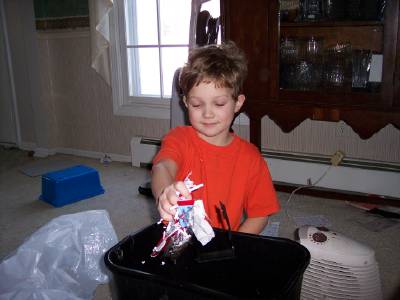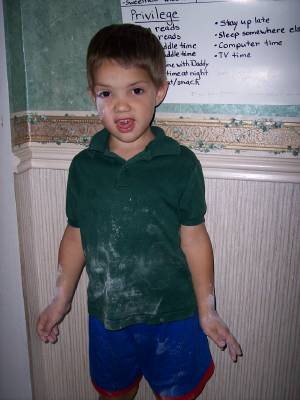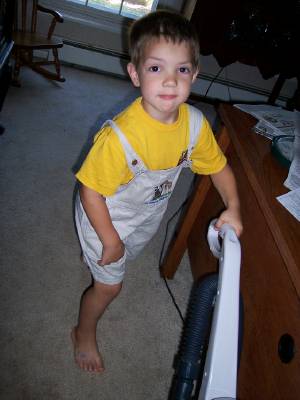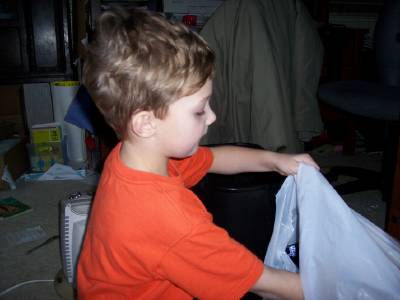Q: How Do You Incorporate Chores With Special Needs Kids?
Q: How would a special needs mom adapt your chores list? For example, One of my kids can’t do a lot of chores that require gross motor and fine motor mastery. Another child has sensory processing issues and lags behind developmentally with chores that other kids her age can do well. Suggestions/thoughts? I have age suggestions, but we are wayyyyyyy behind in them.
ANSWER:
One of my kids had undiagnosed (this was decades ago) sensory, ADHD some OCD & I always suspected oppositional-defiance. Another had eventually diagnosed Dyslexia. Another got severely overwhelmed and shut down if they saw the breadth of a task. I had 4 kids 6 and under homeschooling. Life was hard (good, but hard). Here’s what worked for us.

A SPOONFUL OF SUGAR HELPS THE MEDICINE GO DOWN
I offered LOTS of rewards. Sometimes we called them prizes or treats. They would get rewards for effort more than actually meeting expectations. It was always things they would have gotten, anyway – just normal parts of our day: baking cookies, an ice cream cone, a craft project, visiting a friend, a trip to the park, staying up 10 minutes later, taking the dog on a walk, visiting a friend, choosing what we have for lunch (between 2 choices I gave them), etc.
BUILD ANTICIPATION
I did this through voice intonation, huge smiles & word choices. Did I have an art project planned? “When you’re done with XYZ, I’ve got a special project planned.” “Todaaaay, you get a new privilege.” “WAIT until you see today’s reward!”
SMALL BITES
We broke chores down to their smallest parts. For bigger tasks, like cleaning your room, I put them on index cards (with pictures for the non-readers). Once they are done with one task, they come to me and we turn to the next index card. Cleaning your room: 1. Hang up the clothes on the floor 2. Fold clothes that go in the dresser 3. Put away every block you can find, then all the barbies, then the cars (going from largest items to smaller so you can SEE your efforts quickly). 4. Make your bed 5. Clean under your bed. 6. Put away the rest of the clothes/toys 7. Throw away all the trash 8. Vacuum 9. Call mom to check on the job 10. Get your reward
PRACTICE, PRACTICE
Breaking tasks into small steps is just part of this. It’s important to teach and reinforce each step. We’re NOT striving for perfection, but a modicum of effort and eventual improvement. I actually teach them how to open a cabinet drawer (slowly so all the silverware doesn’t crash into the drawer or fall out). Then I teach them how to close a cabinet door without slamming it. They have to do it right 3 times, in a row while I watch, before they can go on with their day (with lots of smiles and encouragement — this is FUN, easy learning — like a family joke — and a high five when they get to move on). “Walk, don’t run. Start at the end of hallway and try again.” Many of my teenagers gets reminded how to sit on the couch without plopping and has to practice it again.
SMALL BITES BUT SMALLER EXPECTATIONS
Sometimes it’s really hard to know how much to expect of someone else. We don’t know if they’re going through a growth spurt, struggling with something someone said, didn’t sleep well, etc. Knowing they’re interested in the reward and trying to please, plus making an effort to accomplish the task is as good as it gets. They have years ahead of them to get “good” at it. The job may not look like when I do it, but I express pride in their efforts. I have 3 options available to respond to a job half-way done: I can let it go and not worry about it until another time; go back through and re-do the job myself without resentment remembering they are still children; or re-tackle the job together making it a positive experience working together.
A 2 year old could use a wooden spoon to do a half stir of a cake. They’d only get about halfway through the stir before they’d break the rules I’d set (don’t put your hand in the cake mix, don’t pull the spoon out of the bowl, don’t eat the cake mix). To reinforce obedience, as soon as the rules were broken once, we’d end “helping Mama” sessions and they’d have to hop down from their chair. Getting down is NOT a punishment, just a natural consequence “Ope, helping time is done, now.” They aren’t in trouble for doing a bad job. I chose one of the 3 options available to me and that was MY choice, not their fault.

TOOLS TO FIT THE JOB -er CHILD
How frustrating trying to use a hammer to put in a screw. Tools matter. Could you sweep with a broom that towered over your head another 5 or 6ft? You wouldn’t expect yourself to fit the tool — the tools are made to fit you. I made sure my kids had tools that fit their size. (This is especially important for kids whose special needs include physical accommodations.) They had their own real Montessori tools (not toys): a butler sized broom & dustpan, an office collapsible real working vacuum, etc. How can you modify the “work tools” your child uses to fit the child?

ATTITUDE OF PLAY
They were allowed to “play” chores as much as they wanted to with their cleaning tools. If they’d ask me to inspect their job, I would give them high praise for efforts and use it as a teachable moment to play “I spy through Mama’s eyes”. It was a contest to see who could find the most things that still need done. They didn’t have to go back through and do it, that wasn’t their chore, it was a game.
My preschool boys would play “Room Rescue”. They’d put on their Superman capes, I’d use my best Sweet Polly Purebred voice to say “oh, noooo. The room is so messy. I need a room rescue!” And they’d fly in from the other room to recur me from the mess.
We’d do a 10 Second Tidy when I’d count out loud really slowly and they’d have a contest to see who could pick up & put away the most items (first we’d all be in the same room, moving to 2 rooms, then 3, then the whole house when they could handle one room easily). The winner got to pick the reward for everyone.
Music is the sound of parties and work at our house. We’d play music everyone could jam to while we worked. This will likely not work for a sensory-sensitive kid. Maybe classical music? Maybe headphones? We also all worked together giggling and making it as fun as we could. How can you incorporate activities your child gets enjoyment from to make the job a game?
Cinderella– I’d use a “mean step-mother” voice and they’d scrub the floor on their hands and knees (for fun! crazy kids!).
THEIR FUN MIGHT STILL BE HARD FOR YOU
As a parent doing everything right doesn’t mean things go smoothly. Children struggle to learn and follow through with their tasks just like adults do. However the goal isn’t raising children who do everything right. It’s having raised adults who are empowered to tackle even the hard jobs in life with confidence and hope. Keeping that larger goal in mind is so, very, hard when you have an overwhelming workload as parent. Just like you have to have grace for your child, have grace for yourself. Everything won’t get done. You won’t parent perfectly. In the realm of raising children, major on the majors & hope are the roadmap to success.

Not all of this will work for every child. However, the concepts can be applied to all children across the board.
1. Rewards
2. Anticipate enjoyment
3. Teach & reinforce tasks
4. Break tasks into small steps
5. Low expectations & high praise for effort
6. Tools to fit the child
7. Chores done with an attitude of play
8. Patience for them and patience for yourself
Apologies to Mary Poppins and all the songs & TV shows we made our own. It’s how we roll.






